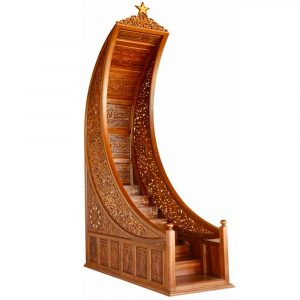A visit to Jum’ah prayer takes a shocking turn.
Previous Chapters: Part 1 | Part 2 | Part 3 | Part 4 | Part 5 | Part 6 | Part 7 | Part 8 | Part 9 | Part 10 | Part 11 | Part 12 | Part 13| Part 14 | Part 15 | Part 16 | Part 17 | Part 18 | Part 19 | Part 20 | Part 21 | Part 22 | Part 23
* * *
“We all need mercy, we all need justice, and—perhaps—we all need some measure of unmerited grace.” — Bryan Stevenson, Just Mercy
Allah Will Take Care Of Me
 Imam Saleh stepped up onto the crescent-shaped wooden minbar, hand-built in Turkey and donated to the masjid by the Turkish consulate in San Francisco.
Imam Saleh stepped up onto the crescent-shaped wooden minbar, hand-built in Turkey and donated to the masjid by the Turkish consulate in San Francisco.
The Imam’s voice was steady, warm, and familiar. Deek – aware of the eyes upon him – pulled his sleeve down to cover his expensive watch, leaned back against the wall, arms folded, and closed his eyes.
He listened with interest when the Imam said:
“Brothers and sisters, let me tell you a story from my student days in Jordan, where I had gone to study Arabic and Islam. One day at the main masjid in Amman I met a man named Yusuf, who had come from Senegal to study the Quran. He had just arrived with nothing—no money, no contacts, not even a place to sleep. I asked him, ‘Where will you go?’ He smiled and said, ‘Allah will take care of me.’”
The words echoed strangely in the hollows of Deek’s chest.
The Imam continued:
“A businessman overheard Yusuf’s story, and offered to sponsor him at the Quran school indefinitely. SubhanAllah. Over the years, I saw him sometimes. He never had an income, but he never complained. Always he said, ‘Allah will take care of me.’ One night, I was out running errands, and I felt an urge to attend Ishaa’ at that masjid where I had met Yusuf. I didn’t usually go there as it was out of my way. I couldn’t explain it, but I went. And there was Yusuf.
After salat, he remained sitting. I went to him and we had a conversation. Only after I had talked to him for ten minutes, and I asked him how his studies were going, did he tell me, “I memorized the entire Quran. But I cannot return home because I don’t have money for the ticket.” I asked him why he hadn’t told me this right away, and he said he’d had a dream that he should come to this masjid tonight and meet me, and everything would work out. So he was waiting for the matter to resolve itself, as he knew that Allah would provide.
I had very little money myself. I spoke to the Imam, and he made a phone call, and soon someone had pledged the money for Yusuf’s ticket. Yusuf returned home, and I never saw him again.
This is tawakkul—trust in Allah. This world is not sustained by wealth, but by Allah’s Mercy. Whoever clings to Him, Allah provides in ways they never imagined.”
Stagnant Rainwater
Deek tried to picture the Senegalese man—hungry, alone in a foreign country, no home or friends, no money, certainly no fancy watch—yet serene. In his mind, another face emerged: his father, standing in the garden in his white dishdasha, saying, “Deek, this dunya will deceive you. Be a good Muslim. Be a good husband and father. That is wealth.” And then his father recited the ayah that he so often repeated: “Say, ‘Consider this: if your water were to sink ˹into the earth˺, then who could bring you flowing water?'”
Deek remembered praying with his daughters when they were little. Amira climbing onto his back while he prostrated in sujood, and Sanaya scolding her. Afterwards, he always scooped them up and kissed their foreheads, teaching them the dua’ after salat. His heart had been light back then.
He thought of Sanaya’s solemn face that morning, refusing even salam. How times have changed. Sadness filled him like stagnant rainwater from a rusty can.
When the prayer ended, Deek remained sitting, saying his dhikr. He’d seen a lot of brothers eyeing him during the khutbah, and it was embarrassing. He checked his phone. Rania’s reply read: “Allah will take care of me.” He stared at the screen. It was the message from the khutbah. Was she here? He stood, hoping to slip out quietly and look for her. But before he could depart, a cluster of brothers gathered around.
A Flood Of Questions
One was a tall Afghan man in a worn shalwar kameez, his beard streaked with gray. “Brother,” he said warmly, “you are Deek Saghir, yes? I heard you are doing very well with the crypto. Masha’Allah. Tell me, how do you buy these coins? Can I just go to the bank?”
 A Latino brother, young and muscular and wearing a backward baseball cap, leaned in eagerly. He could have been a pro ball player preparing to take a swing. “Is it true that people become millionaires overnight? My cousin says he missed out on Dogecoin. Do you think it’s still possible?”
A Latino brother, young and muscular and wearing a backward baseball cap, leaned in eagerly. He could have been a pro ball player preparing to take a swing. “Is it true that people become millionaires overnight? My cousin says he missed out on Dogecoin. Do you think it’s still possible?”
An older African-American brother wearing a bright African daishiki and a white kufi, frowned skeptically. “But what if it’s gambling? Some say it is haram, no different from the lottery. What do you say, akh?”
Their faces pressed close, voices overlapping.
“Are you a millionaire now?”
“Can you tell us your secret?”
“Can you give us a class?”
A tall, doe-eyed teenager sidled up beside him and tapped the sheath of the knife on Deek’s hip. “Why do you have this?” The boy seemed innocently curious, but Deek placed a protective hand over the knife.
“Pathetic.” This last came from a young African-American brother wearing black jeans and a Raiders shirt, leaning against the wall with his arms crossed. Deek didn’t know if the comment was a reference to Deek himself, or to the desperate, grasping admirers surrounding him.
Deek felt his pulse quicken. His mouth opened, but no words came out. He glanced across the prayer hall and caught sight of Faraz leaning against the wall, watching with his usual grin. Deek lifted his hand in a quick, sharp gesture: Is this your doing? Faraz only raised his eyebrows and shook his head, palms up in mock innocence.
Deek forced a smile, stammering. “Well, you see… cryptocurrency, it’s, ah… it’s not like dollars exactly. It’s, um, decentralized. You could say it’s like… like math, really. Secure math. People trade it, and the value goes up and down. Some… some people win, some lose…” His words tangled, and he felt heat rising in his face.
A Desperate Plea
One brother, a fiftyish Pakistani with a proud nose and a receding hairline, dressed like a college professor in slacks and sports coat, seized Deek’s lapel. Deek didn’t know the man’s name, but he’d spoken to him before. He was a doctor with a daughter a few years older than Sanaya. She was a pharmacy student. The man had always seemed calm and even slightly jovial.
Now, however, his eyes were bloodshot, and his normally well-coiffed hair looked uncombed.
“My daughter is sick,” the man said. “I’ve spent everything. I have no money left for her treatment.”
Deek tried to pull away, but the man held him fast. “Share what Allah has given you.” His voice rose. “Don’t be selfish!”
Imam Saleh stepped between them and physically pushed the brother away. “Doctor Rana!” he snapped. “This is not appropriate.”
Deek took a step back, caught his foot on the edge of a rug, and fell with a startled cry.
“I don’t care about appropriate!” Rana shouted. “Allah has abandoned me.”
Imam Saleh stepped toward the distraught doctor, and for a shocked second, Deek thought the Imam would hit the man. Instead, Saleh embraced the desperate father and whispered in his ear. Rana’s shoulders slumped, and he turned and walked out.
Saleh made shooing motions at the remaining brothers. “Everyone out, please. Show’s over. Respect brother Deek’s privacy.”
Deek got back to his feet, rubbing his wrist, which was sore from breaking his fall.
The men dispersed reluctantly, muttering thanks and salams. Deek exhaled and smoothed his lapels. His hands remained on his chest as if to shield himself. His breath was shaky.
Imam Saleh approached him gently. “I am very sorry. Dr. Rana is going through a difficult time. But that doesn’t excuse his behavior.”
Deek lifted one shoulder. “Not your fault. And I understand. If one of my daughters were sick and I couldn’t help her, I’d lose my mind too.”
Imam Saleh rubbed Deek’s shoulder. “You’re a kind man, mashaAllah. I’m sorry about the other brothers too. They are curious, and perhaps too eager.”
Deek’s heart was still running, but he gave a slight nod. “I understand.”
“You probably don’t want to do that seminar anymore.”
Deek swallowed. “I don’t know.”
Before leaving, Deek asked for Dr. Rana’s address. If the Imam was surprised, he didn’t show it.
Rolling In It
There was no sign of Rania outside. Faraz caught up to him in the parking lot, slapping him on the shoulder. Deek flinched, still gun-shy after his experience inside, but Faraz was an old friend, and he told himself to relax.
“Deek! Broooo! Look at you in the suit, so beautiful like a wave of the ocean. MashaAllah, mashaAllah.” His voice lowered to a conspiratorial whisper. “You rolling in it now, right? How much? How many millis?” He rubbed his fingers together and said, “Cha-ching, cha-ching!”
“I guessed you missed all the drama just now?”
“What, something happen? I see them crowding you. So sorry.”
Deek smiled. “No big deal. But what about you, akhi? The market is firing on all cylinders. You must have cleaned up too.”
Faraz’s face fell. “I drop it all on a meme coin. My cousin part of the project, he say the founders have a roadmap and investors. But was a scam. I lose everything. My cousin too.”
Deek was shocked. “You put everything on one meme coin?”
Faraz made an angry gesture. “Was stupid. Don’t matter, is Allah’s qadar. What happen, happen.”
Deek exhaled loudly. “That’s rough. I’d loan you some Solana but I exited crypto. I sold it all. The crash is coming.”
Faraz poked Deek in the chest. “You a oracle, smart like a Bengal tiger. I tell you what, buy me espresso machine, I be happy man.” Again his voice fell to a whisper. “Just between me and you. How much you make? I don’t tell no one.”
Deek looked at his old friend, remembering how they’d started together in crypto, both nearly broke, trading ideas and strategies over coffee and sweets. And not just any coffee, for Faraz was a coffee connoisseur. Deek remembered the first time Faraz had invited him to the masjid kitchen to chat about crypto. The man busied himself over an old coffee maker while Deek munched on some leftover birthday cake someone had left in the fridge. Deek, expecting the stale coffee that might be served in a dilapidated mosque kitchen, was stunned when Faraz served a gorgeous brew that was clean and light yet complex, with hints of berries, toffee, and sweet herbs.
Seeing Deek’s amazed expression, Faraz grinned. “Ethiopian. The birthplace of coffee.”
After that, their little crypto get-togethers became hedonistic soirees featuring whatever gourmet coffee Faraz had sourced that week, along with the Petit Ecolier cookies that Deek adored, and of course, long debates about the merits of one crypto over another.
Now, standing in front of Deek in the parking lot, Faraz gestured with his chin and said, “Is okay, you can tell me. How much?”
“Half a billion dollars.”
Faraz’s mouth fell open. Tears sprang to his eyes. He embraced Deek, then stepped back, patted Deek on the chest, and walked away.
Watching him go, Deek tasted sadness like acid in his mouth. Faraz had a wife and three kids. His job at the center didn’t pay much. What did he have left now? Why had Deek gotten rich, while Faraz went bust? It could just as easily have happened the other way around.
He could not help Faraz by simply giving him money. He had learned that much. It would humiliate the man. But maybe there was a way he could help both of them. He thought about it for some time, then made a phone call.
A Trust From Allah
 The car was parked in the shade of one of the walnut trees in the masjid’s front yard. Deek sat in the car and rolled down the windows. Part of him wanted to pull his limbs and head into a shell and hide from everyone. Just manage his money and forget the world. But that would mean a lifetime of dreams in which he was haunted by the increasingly strident figments of Rabiah Al-Adawiyyah and Queen Latifah.
The car was parked in the shade of one of the walnut trees in the masjid’s front yard. Deek sat in the car and rolled down the windows. Part of him wanted to pull his limbs and head into a shell and hide from everyone. Just manage his money and forget the world. But that would mean a lifetime of dreams in which he was haunted by the increasingly strident figments of Rabiah Al-Adawiyyah and Queen Latifah.
He had not forgotten his satori, his realization that he was meant to be a conduit for this money. This wealth was not for him to hoard. In fact, it was not his at all, but was a trust from Allah Subhanahu wa Ta’aala. Nor did he have the right to decide who was worthy and who was not. He was not a judge, nor was his own heart pristine. In fact, he could be a flat-out jerk sometimes. Lubna could certainly testify to that.
He went into a discount clothing store a block away and bought a plain black t-shirt. In the car, he removed the suit jacket, dress shirt, and German watch, and slipped on the t-shirt. He still wore the suit pants, but he mostly looked like a regular guy.
Dr. Rana lived in an upper-middle-class home in Clovis. Deek noticed right away that though the two-story house was quite large, the lawn and garden were overgrown and turning brown. He rang the doorbell and wiped nervous sweat from his upper lip.
The door cracked open, and Dr. Rana stood in the frame. His jaw was tight, his back straight as if he expected confrontation. His eyes, red from sleepless nights, held no warmth.
“Mister Saghir,” the disintegrating doctor said, clipped and formal. “I imagine you have come for an apology.”
Deek raised his hands slightly, palms out. “Not at all. I came to help.”
The stiffness in Rana’s shoulders gave way in an instant. His face twisted, and with a sudden, almost desperate motion, he stepped forward and embraced Deek. His body trembled. “Astaghfirullah,” Rana whispered. “Forgive me.”
Deek patted the man’s back, feeling his spine through his thin shirt. “There’s nothing to forgive.”
Rana gestured him inside. “Please, come.”
Undimmable Grace
The house was dim, curtains drawn. The air carried the faint smells of lentils and disinfectant. Something had left grooves in the carpet. Rana led him to the dining table, muttering, “Sit, sit.” He disappeared into the kitchen and returned with two cups of lukewarm tea, placing one carefully before Deek.
Only then did Rana sit, folding his hands tightly. His voice came soft and halting. “It is AL amyloidosis. We began chemotherapy months ago, but the response has been poor. Her kidneys are failing. The only chance now is a stem cell transplant. But Fresno cannot provide it. UCSF has a long waitlist, Stanford requires an impossible deposit, and the Mayo Clinic…” He shrugged helplessly. “Mayo is the best. But insurance will not cover it. Out of network, they say.”
Deek’s throat constricted. “If nothing is done?”
Rana swallowed hard. “She may have a year. Two, if Allah wills.”
The words hung like ash between them. Then Rana straightened slightly, as if gathering himself. “Would you like to meet her? She is resting, but… let me see if she is able.”
He rose and went down the hall. Deek heard a soft murmur of fatherly tones, the creak of a bed being adjusted. After a pause, Rana returned and nodded, eyes glistening. “She is awake enough. Please.”
 He led Deek into the back bedroom. Curtains filtered the light to a dull glow. Against the wall stood a hospital bed, the girl propped on pillows, oxygen tubing running beneath her nose, IV line in her arm. Her face was thin and pale, her hair tucked back beneath a scarf. Her sunken eyes looked up when they entered. So young. A few years older than Sanaya, though the illness made her look aged.
He led Deek into the back bedroom. Curtains filtered the light to a dull glow. Against the wall stood a hospital bed, the girl propped on pillows, oxygen tubing running beneath her nose, IV line in her arm. Her face was thin and pale, her hair tucked back beneath a scarf. Her sunken eyes looked up when they entered. So young. A few years older than Sanaya, though the illness made her look aged.
Despite the pallor of illness, there was an undimmable grace about her, a dignity that shone even through the haze of fatigue.
Deek’s breath caught.
“This is my daughter Maryam,” Rana said softly. His hand lingered on the bedrail.
Deek stepped closer, feeling as if he were back on the planet Rust. An alien in a strange world, unfamiliar with the customs, having no words to speak. After a moment, he managed to say, “As-salamu alaykum, Maryam. It’s very nice to meet you. I’ll be making dua’ for your recovery, inshaAllah.”
Her lips curved faintly. Her voice was weak but clear. “Wa alaykum as-salam. I know your daughter… Sanaya. We met… at masjid events. She’s whip-smart. When Shaykh Saleh… asks a question… he sometimes says, ‘Anyone except Sanaya.’ Because he knows… she already knows the answer.”
The words struck Deek like an arrow, and for a moment he could only nod, his throat tight. “That means a lot. JazakiAllahu khayr.”
Rana placed a hand on his daughter’s shoulder. “Rest now, Beti.” She closed her eyes, the faintest smile lingering as they left the room.
Back in the living room, Rana lowered himself heavily into a chair. His hands rubbed together compulsively, his voice hesitant. “I did not introduce you to her to burden you, brother Deek. You’ve already been kind. I only wanted you to understand why—”
Deek raised a hand, firm. “Doctor. Don’t say anything else. I will pay for everything. The treatment, the travel, the lodging, and the bills you owe already. All of it. Don’t argue, don’t refuse. Your daughter’s life is not up for negotiation.”
Rana blinked, as if the words did not register at first. “It could… it could be a lot of money.”
“It wouldn’t matter if it were millions. Consider it paid for.” He handed Rana one of his new business cards. “Email me the info on anyone you owe money to, whether medical providers or anyone else. And send me your bank account information, I’ll deposit some money for your immediate needs.”
Rana sagged back into the chair, covering his face with both hands. When he lowered them, his eyes were wet but steady.
“You are a great man.”
“No.” Deek shook his head. “I’m really not. I just want to know who I am when I look in the mirror.”
“What do you mean?”
Deek smiled. “Nothing, just… trying to figure things out. Mercy is what sustains the world, right? Isn’t that what the Imam said today? I need your mercy on me, Doctor Rana.”
Rana looked astounded. “My mercy on you?”
Deek nodded. “Yes. I think so. I need your dua’, and your friendship. Take care of your daughter, Doctor.”
***
Come back next week for Part 25 inshaAllah
Reader comments and constructive criticism are important to me, so please comment!
See the Story Index for Wael Abdelgawad’s other stories on this website.

Wael Abdelgawad’s novels – including Pieces of a Dream, The Repeaters and Zaid Karim Private Investigator – are available in ebook and print form on his author page at Amazon.com.
Related:
Day Of The Dogs, Part 1 – Tiny Ripples Of Hope
Searching for Signs of Spring: A Short Story
The post Moonshot [Part 24] – What Sustains The World appeared first on MuslimMatters.org.





